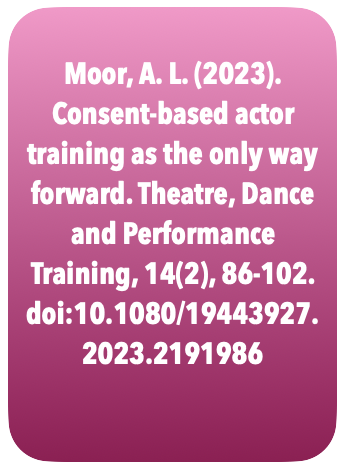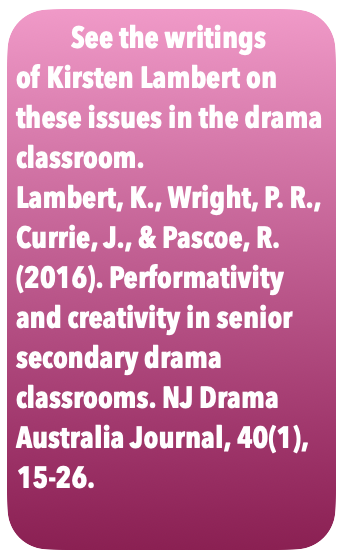Drama Tuesday - Issues for Drama Teachers – consent, coercion, texts and the secondary school drama classroom
/ There is an increased attention to safe theatre practices resulting from the #BlackLivesMatter and the #MeToo movements. Reading the article by Moor (2023) alerted me to the impact on tertiary level Drama Schools and actor training leading to significant change. It then occurred to me to wonder about the implications for the secondary (or primary) school drama teacher.
What alerts do we need to have as drama teachers about ensuring our practice in the classroom and workshop is safe and appropriate? Drama classes include but are more than actor training. But how should we be considering the principles of consent-based actor training in the broader context of drama teaching.
Consent based actor training incorporates safe consensual agreement of touch, appropriate support in dealing with challenging material, non-biased casting, appropriate recognition of gender, safe acting practices, safe cultural practices, diversity of representation in teaching and directing staff and clear guidelines for discussion and complaint. In a nutshell consent-based actor training ensures the safety and agency of all actors in training (Moor 2023, p. 89).
These ideas prompt me to think more deeply about responding to these imperatives of drama teaching.
Consent.
As drama teachers we pay attention to creating engaging learning environments. We include warming up and edging into the drama activities to prefigure the lesson focus. We include cooling down and reflection activities to provide a frame for the learning focus. We include “rules’ about respecting ideas and opinions of others. In the wider framing of the learning, we need to also consider other ways of framing the boundaries of interpersonal behaviour. The Australian government has mandated consent instruction in all schools from 2023 (Leunen 2022). Awareness of consent, the setting or physical, social and emotional boundaries need to become part of our active protocols. This issue is more than sexual consent and focuses on principles of student agency and awareness.
What are the appropriate drama based activities for developing consent awareness in our drama students?
Coercion.
There is increasing attention to approaches to actor training (at all levels) where there are imbalances of power. There’s firm calling out of those acting teachers who claim that they “break then rebuild” their students. Nowhere is this responsibility of care more necessary than when working with younger students. How aware are we as drama teachers of the forms of subtle coercion we exert? How much pressure do students feel to “please the teacher” by doing what we suggest and direct.
I have often wondered when some drama teachers talk about “my vision” for the production, whether this is subtle coercive power at work (I could ask the same of any theatre director.) In a similar way, I wonder about practical drama exams where the expectation is that the students own original work is being shared – or supposed to be shared. Is this truly the student’s work or are they projecting the work of the teacher as director?
What awareness do we need to develop about the forms of coercion that can be found in the drama classroom.
Texts.
In the current education climate (especially in USA schools – see our earlier posts on banned texts) there is much attention given to teaching appropriate and acceptable texts. This is having a flattening effect on choices made by drama teachers. There is a need to consider carefully the content of all play materials and supporting texts. Much of the literary and theatrical cannon is open to question. Do well-known texts need more thought. For example, just a few from Shakespeare: Othello and The Merchant of Venice deal with issues of racial discrimination. Is Hamlet a play about mental illness? Romeo and Juliet deal with the consequences of impulsive teenage infatuation and sexual impetus.
The flip side of this is the reliance on “safe” drama texts that provide sanitised versions of life experience. That is deadening the impact and relevance of drama teaching and learning.
Do we need activation and trigger warnings? Has it come to the point where there is no safe text for drama?
The issues of inclusion, diversity, gender, bias, culture also could be added to this discussion.
Teaching drama is complex. Living in contemporary society is complicated.
And there is always a danger of losing sight of the goal of drama education by being weighed down by the other considerations (what sometimes teachers call “paperwork and bureaucracy”). But we can no longer plead ignorance as a defence.
Bibliography
Leunen, S. (2022). Mandatory Consent Education is a Huge Win for Australia but Consent is Just One Small Part of Navigating Relationships, The Conversation. February 21.
Moor, A. L. (2023). "Consent-based actor training as the only way forward." Theatre, Dance and Performance Training 14(2): 86-102.







